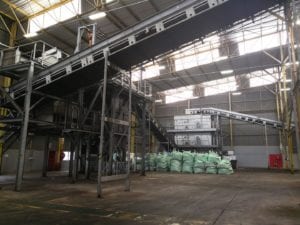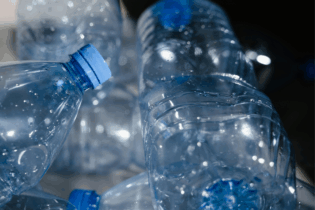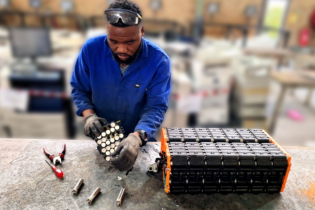Mpact Polymers is a R350-million state-of-the-art bottle-to-bottle recycling facility. A first of its kind in Africa, the plant is out to prove that plastic bottles are not trash. Infrastructure News visited the plant for an inside look at the life cycle of a plastic bottle to better understand the recycling ecosystem.
Inside the plant
- The plastic bottles arrive at MPACT Polymers in Wadeville Johannesburg in bales. The plant keeps 450 tonnes in yard as stock to keep the production of the plant running.
- The plastic bottles then make their way through a series of conveyor belts and high-tech lasers that sort the material removing all foreign objects as well as the labels.The bottles then go through another sorting process which seperates clear PET from light blue PET.
- During the sorting process all other materials that are not PET are removed and prepared for shipping to be recycled elsewhere, (nothing goes to waste!)
- The PET bottles that survived the sorting process are then ground up into flakes and taken through wash modules that contain chemicals to clean the flakes and remove all the dirt (after all the flakes are going to be transformed into recycled PET for food and beverage packaging).
- The flakes are then put through another sorting module which removes all the coloured and non PET flakes (these are often bits of the closures or lids that manage to get into the grinding process).
- From washing the flakes go through a decontamination process which involves heating the flakes to remove all the moisture. They are then taken through a vacuum reactor where they are decontaminated for a few hours.
- From here the flakes are taken through an extrusion process to melt the flakes and convert them to a mould from which they will then be palletised into smaller sizes.
- Finally the pellets are dried and placed in bags ready for dispatch to all MPact Polymer customers.
Breathing life into recycled PET
Mpact Polymers enjoys the highest internationally recognised standards. It is the first plant in Africa to meet The Coca-Cola Company’s full certification for PET bottles to package the company’s soft drinks, while the recycling process complies with European Union (EU) Food Safety Authority specifications. As such Coca-Cola Beverages South Africa (CCBSA) makes use MPact Polymers recycled PET, known as Savuka. From the plant the recycled PET is transported to CCBSA where preforms are blown into PET bottles and subsequently filled. Currently CCBSA PET bottles have between 10-15% recycled content with the organisation able to run up to 25% recycled content.







